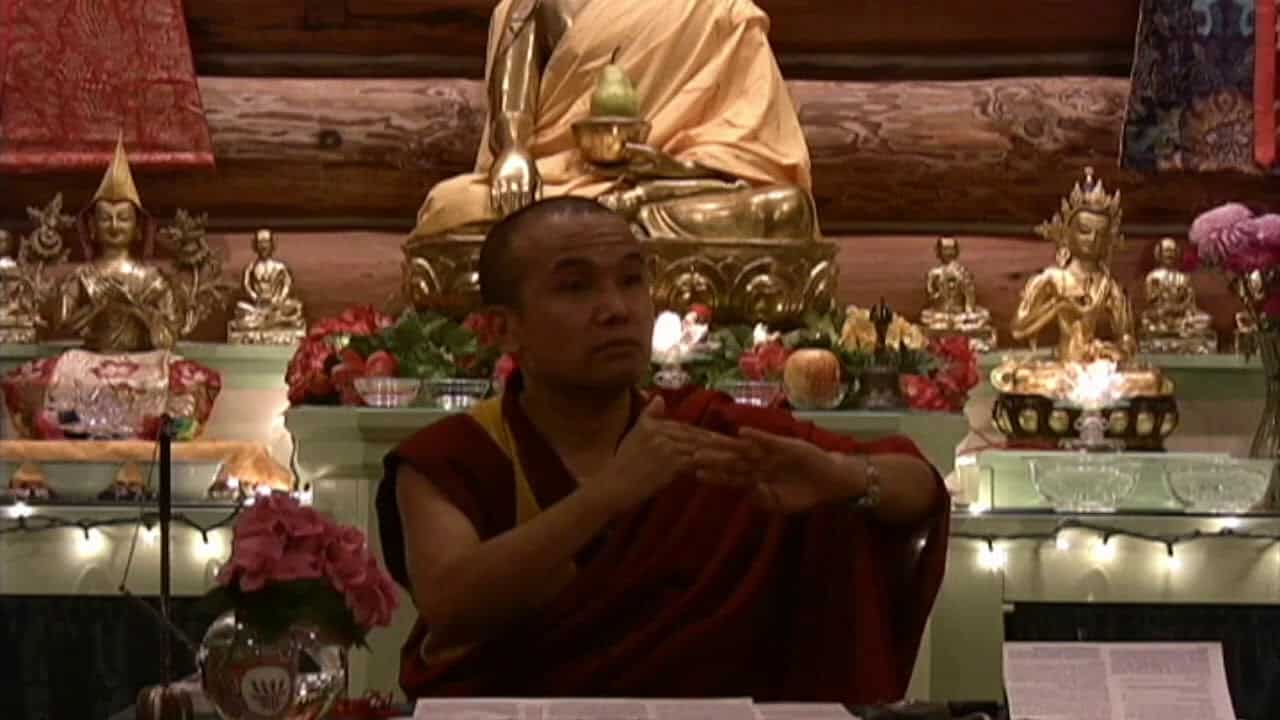Verse 17-2: Taking care of ourselves
Verse 17-2: Taking care of ourselves
Part of a series of talks on the 41 Prayers to Cultivate Bodhicitta from the Avatamsaka Sutra (the Flower Ornament Sutra).
- Take care of ourselves and our karma
- Not be diverted by attachment
41 Prayers to cultivate bodhicitta: Verse 17-2 (download)
Yesterday we were talking about number 17:
“May I close the door to the lower forms of life for all beings.”
This is the prayer of the bodhisattva when closing a door.
We talked about how before we can talk about closing the door to lower rebirth for other sentient beings, we have to close the door to lower rebirth for ourselves, because if we wind up in the lower realms then there’s no possibility in a future life to benefit others until we have a better rebirth. When we really care about others than we also have to take care of ourselves in a proper way.
I think this is really important because sometimes we get this funny mind that, “Oh, I just sacrifice everything for others, so I’m going to give everything I have away and I’m just going to work myself to death because I’m working for others….” And it doesn’t work. We have to be practical and take care of ourselves, take care of our health, take care of our body, take care of our karma so that in future life we have a good rebirth and so not let either low self-esteem or attachment divert us from this.
Sometimes with low self-esteem we go, “Oh, I’m not worthy of being taken care of or I’ve got to sacrifice everything, give everything away for the Dharma because I don’t deserve to have anything,” and that’s not good, you know, because we have to be practical and also we have to give not from a sense of I’m unworthy but from a sense of I’m worthy and I’m being generous. Are you getting what I mean?
It’s the same with protecting our karma. When I said lets not let ourselves get diverted by attachment, sometimes out of attachment to one sentient being we can give up the possibility of benefiting many sentient beings. Then, what happens with that attachment is that because of the attachment, we create many negative actions and we do not take advantage of our precious human life. Then in the next rebirth we wind up the lower realms, even though we told our self this rebirth that we were benefiting others by being attached to them and doing what they want. In the actual long term we are not benefiting them because if we do not have a good rebirth next time how are we going to benefit those people then?
In Dharma it’s very important to really take care of ourselves properly, not because we’re self-centered, not because we’re selfish, but because we have to maintain our body and health, we have to maintain a positive state of mind so we can create good karma for the benefit of others, because we’re intertwine. Like I said sometimes people get this funny mind, “I’ll just give everything away because I’m practicing the bodhisattva’s generosity,” and then they don’t have money for food and it becomes a real problem for the people around them. Or they don’t have a place to live and the people around them are going, “Oh, what do I do, I don’t want you to be on the street.” That’s not good for the people around us.
If we’re distracted by attachment and we wind up in a lower realm, we can’t benefit anybody then and even this life if we’re distracted by attachment to one or two people, then we give up the opportunity to benefit so many.
It’s really important to think clearly about these things and have a sense of ourselves as efficacious, worthwhile people who can, as we’re trying to be kind to others because we respect them and see them as worthwhile people, then we have to have that feeling for ourselves too, don’t we? And to respect ourselves and to feel that we’re worthwhile, and that’s not being self-centered.
If we cherish ourselves more than everybody else, that’s being self-centered. If we think, “My happiness is more important than anybody else’s, forget others,” that’s being self-centered. But we shouldn’t go to the other extreme and say, “I’m totally worthless,” and then not use our potential and then even physically become a burden to others. Are you getting what I’m saying? This is important.
We want to abandon the self-indulgent mind, which is the mind of attachment, but we’ve got to respect ourselves and our own virtuous qualities and use those for the benefit of others. Not just “I have virtuous quality so I’m going to use them, and then I’ll be top person at the monastery, people will praise me, they’ll give me a lot of offering,” that’s rubbish. Respect our virtuous qualities, make use of them because they’re there and we use them for the benefit of everybody.
Venerable Thubten Chodron
Venerable Chodron emphasizes the practical application of Buddha’s teachings in our daily lives and is especially skilled at explaining them in ways easily understood and practiced by Westerners. She is well known for her warm, humorous, and lucid teachings. She was ordained as a Buddhist nun in 1977 by Kyabje Ling Rinpoche in Dharamsala, India, and in 1986 she received bhikshuni (full) ordination in Taiwan. Read her full bio.

